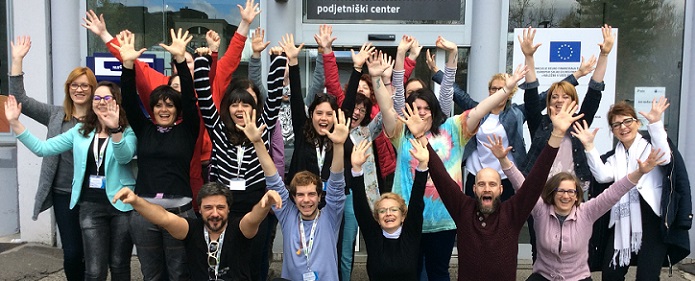
Lights, camera, accessibility: making culture more inclusive through business skills training
The University of Wolverhampton is aiming to make theatres, museums and cinemas more accessible - by boosting the entrepreneurial skills of audio describers and subtitlers.
Through its Erasmus+ project CASTLE - New employability skills and business creation in the audio description and subtitling sector, the university is developing business start-up resources to help these experts effectively market themselves to the culture sector.
Having completed a previous Creative Europe project called 'Theatres for All', the university discovered that there was a gap in the needs of the cultural sector relating to accessibility and the business skills of the those able to provide the solution.
Alison Carminke, the project co-ordinator, explained: “We realised there was a group of people that have subtitling or audio description skills but didn’t know how to set themselves up as a business or promote their skills to potential employers.
“The theatres that took part in the previous project also reported that they didn’t know where to find audio describers, but wanted to make their performances more accessible. So the idea was to bring the two together to make it easier from a business perspective for theatres to offer more inclusive performances.”
Varied viewpoints
The project included a range of partners from Italy, Spain, Slovenia and Poland as well as the UK, including a theatre, a local accessibility organisation, a cultural centre, and business training and development organisations.
“It’s beneficial to have a variety of partners involved in the project as you get a different perspective from the different kinds of organisations," said Alison. "They each bring their own target audience and current networks to the partnership."
Through the project, the partners are developing two outputs - a practical handbook for entrepreneurs in cultural accessibility and an interactive web platform to support networking, identify winning business models and to act as a contact point for potential customers.
The handbook is currently available to download on the project website and the platform will be live from October.

Success stories
The business training aspect of the project has already received positive feedback from participants.
“For the workshop we held in Slovenia, we brought together 24 people from each partner country to take part in business training,” Alison said.
“We have really been able to get them to look outside their national context. Responses to the workshop were really positive; we asked them to rate themselves one to five in various categories both before and after the training.
“Before the training no one rated themselves as a five for entrepreneurial skills, after the training it was about 15%. We saw similar responses around knowledge of different business models, management and opportunities.
“Creativity was an area where we saw ratings double after the training, which was a benefit we didn’t expect as the course focused on business skills. So it was nice to see that they benefitted in creativity, just by meeting other people from their field.”
“It’s been incredible to be part of something where you bring so many countries together and talk about accessibility,” said Sue Howell, a project participant from Wolverhampton Grand Theatre. “It has been refreshing to see that there are so many countries interested in making theatre, art and culture accessible for everybody.”
Inspiring aims
The previous Creative Europe project had concluded that "audio description has to become the norm, not the exception, as it is today. Equal access to museums, theatres and places of cultural interest is a right of visually impaired people, not a luxury.”
The CASTLE project aims to move towards that goal, benefiting three main audiences: audio describers and subtitlers, cultural institutions and those with hearing or visual impairments.
“We hope that more people will either become self-employed in audio description and subtitling or that they will set up their own businesses and start working together,” Alison said.
It’s been incredible to be part of something where you bring so many countries together and talk about accessibility.
“We also hope that, through the increased networking offered by the platform, theatres will say there is less of a gap in supply and demand for inclusive performances.
“And for those with hearing or visual impairments, we hope that there are more performances locally available for them."
Kirsty Povey, a CASTLE participant from Arena Theatre, Wolverhampton, spoke about the benefit it could bring.
“It’s been an absolutely fantastic opportunity, where different countries have come together to discuss the business opportunities within access,"she said. "Over the next few years, these projects are going to be really important in bringing the world together so we are all able to access this world as we should.”
Working with Erasmus+
“We wouldn’t have been able to do this project without Erasmus+,” Alison explained. “Erasmus+ has been vital in getting all the partners to work together and in identifying what is happening in the different countries involved, as well as simply funding the workshops.”
Alison shared her top tip for applying for Erasmus+ funding: “It’s really important to think about your impact right from the application stage. What do you want to achieve? How are you going to achieve it? What is the supporting evidence that you have to show there is a problem that you are solving?
“Once you have completed your project, how will you solve that problem? If you can make that clear, it should be obvious to the assessors what the benefits are.”
Inspired by this story to apply for Erasmus+ funding? Find out more about the next steps by visiting our apply for funding page.
